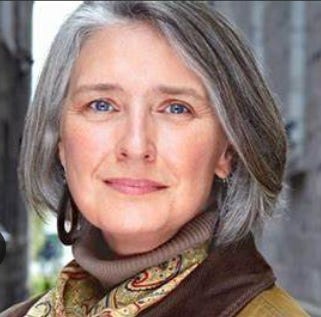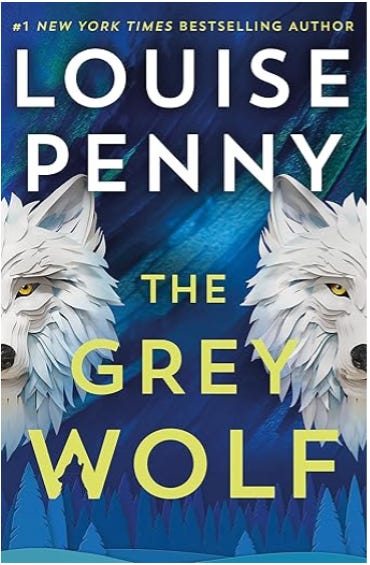When I read the Three Pines books, I hear her voice. She was on CBC radio in Thunder Bay, and that’s where I’m from. I also heard her on CBC Winnipeg while I was working in rural Manitoba.
She came to writing fiction after a long career in broadcasting, and her worked gained attention after Still Life was a finalist in the Debut Dagger competition in the UK. She paid it forward when she helped Crime Writers of Canada establish an award for unpublished Canadian crime writers.
In 2019 I was a finalist for that award, and that recognition has meant much to this well-past-middle-age second career writer. It has been very helpful to be able to put a literal stamp of approval on the cover of my first published book, The Book of Answers. That book is a much revised and repaired version of the manuscript that became one of five on the short list for what was then called the Unhanged Arthur, and is now called a Crime Writers of Canada Award of Excellence.
I am keenly aware discerning readers are cautious about books that do not bear the imprint of a major publishing house. The “finalist” seal has definitely helped people take a chance on my book, and I am grateful.
I am well into the writing of the next Rev. Thomas Book Mystery. It’s tentatively called “The Book of Christmas Joy”, and is set in slightly fictional small town in Southwestern Ontario, that bears some resemblance to the place I live.
My writing mentor, the fabulous Melodie Campbell told me The Book of Answers was a cozy mystery. It features an amateur detective who is drawn by necessity into solving a murder mystery. The cozy comes with certain expectations of the readers. There is generally, no on-screen violence, gore, cruelty, or sex in a cozy mystery. I’m okay with those!
I’ve also got another Rev. Thomas Book story in the works, that would happen in the gap between The Book of Answers and The Book of Christmas Joy. It’s called The Book of Strong Suggestions, and I wrote most of it during the worst of the Covid-19 pandemic, and it’s set in March-April of 2020. It has more of a thriller feel to it, and while there is no on-screen sex, there is definitely more violence and gore than my “cozier” work. (Which may reflect the mood of that time!)
The other element that emerged when I was working on that book was social commentary. I realized I had a strong desire to use my mystery story as a vehicle for questions and ideas that might inspire people to look at the world in a more critical fashion. (That might be the retired preacher in me coming out.)
There is a debate in the world of crime fiction about whether or not a mystery should go beyond its function as escapism, and dare to make political or social statements. In particular, it’s often said that cozies are the “feel good” cousins of hard-core detective stories, and should stay away from politics, or social critique.
Personally, I look for at least three things in my crime fiction.
The first is a strong sense of place. I’m not into generic stories that could happen anywhere. I like the setting to be a character in the story, to influence the plot, and in some way determine what is at stake for the characters.
The second is a well-defined protagonist, (usually the sleuth) who is interesting as a person. I may not like the detective, but I want to believe they could be a real person, with a deeply considered back story, and a credible psychology. The things they do and say should fit with who they are.
The third is a world-view. This is something like a philosophy, or way of negotiating existence in the setting as it is presented. In this I am influenced by John Truby, who in The Anatomy of Genre, makes the case that certain forms of stories are uniquely positioned to help us wrestle with particular life questions.
I love that my first mystery novel was favorably compared to the Three Pines Books, and that Rev. Thomas Book was characterized by one reviewer as “Father Brown meets Armand Gamache”.
One of the great achievements of Louise Penny’s work is that in Chief Inspector Armand Gamache, she offers us a character who has experienced life in very dark circumstances, and has battled against people who were doing despicable things, but has nonetheless kept a positive, and hope-filled perspective. He chooses to believe that all people are capable of making better choices.
I’ve been proud and excited to see Louise Penny with her “Elbows Up”, taking a pro-Canada stand. She has been public about her choice not to do personal appearances in the United States to support the promotion of her latest Gamache story, The Grey Wolf. That will no doubt cost her the loyalty of some of her long-time readers.
I am reading The Grey Wolf this week, and was struck by the power and the timeliness of these words, in which Penny does not shy away from using the vehicle of her story to raise vital questions:
“Canada might not be the most powerful nation on earth, but power was shifting from weapons to resources. And Canada was resource-rich. Which was tipping the balance of power.
Where once the population had been dismissed as hewers of wood and drawers of water, servile and menial, now, in this climate of change, that description turned out to be a very good thing. Canada had plenty of wood to hew and fresh water to draw. To drink.
They just had to do a much better job of protecting it.”
pp. 202-203, The Grey Wolf, by Louise Penny, 2024 Minotaur Books









As you know I lean toward historical fiction and memoir but now I'll be taking a look at her books. Thanks for the poke.
Great post ... looking forward to "Christmas Joy" ... and please, please tell Canadians and we living south the border, even our senators, representatives and judges can't keep up with the sleight of hand of this dangerous barnyard show-off (no roosters are harmed in this comment)